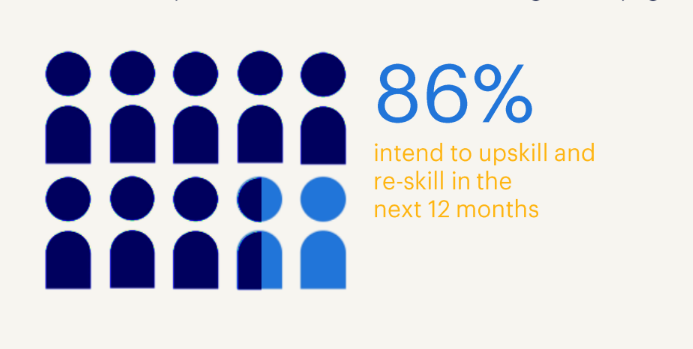- The impact of the pandemic on the local labour market has motivated more people to upskill and re-skill to remain employable in the future.
- 55% want to reskill and upskill so they are prepared for automation and digitalisation.
- 58% of respondents are willing to accept a job offer with a lower salary.
SINGAPORE | 86% of local respondents said that they have the intention to upskill or re-skill in the next 12 months, a local survey revealed.
The 2020 COVID-19 Labour Pulse Survey was commissioned by Randstad Singapore, and surveyed 638 of locally- based employees between 26 June 2020 and 5 July 2020. The study aims to understand the local workforce’s sentiments about the employment market this year, including the challenges and experiences of job seekers thus far.
re-skilling and upskilling remain crucial in securing employment.
Of the 86% of respondents who are motivated to re-skill and upskill themselves, 55% said that they are doing so to be prepared for how automation and digitilisation will affect their future; 19% are looking to change their career or industry that they work in, while 16% mentioned the fear of losing their job due to redundancy.
Jaya Dass, Managing Director, Malaysia and Singapore at Randstad said, ”People tend to expect and plan for the worst-case scenario, especially since we are starting to learn of the long-term impacts of the pandemic on the economic and labour markets. As such, many employees have demonstrated their interests for re-skilling and upskilling programmes to build a variety of skills and exercise more flexibility in their career development.
Employees are also harbouring greater expectations for their employers to help guide their career development, specifically what type of skills to acquire and how to build their digital capabilities in the ‘new normal’. Employers should strive to meet the employees’ expectations and elevate the quality and readiness of their workforce to prevent a further widening of the skills gap.”
58% of respondents are willing to take on jobs with a lower salary.
The pandemic has resulted in weaker labour market conditions, as the number of unemployed increases and the number of available jobs in the market decreases. When asked about their salary expectations in 2020, 58% of respondents said that they are willing to take on jobs with a lower salary.
Dass explains, “Job seekers with prerequisite skills and experience in high demand areas, such as technology and research & development, will be able to negotiate for a higher salary when switching employers. However, individuals whose employment has been impacted by the pandemic are encouraged to keep an open mind, as having a lower salary can still provide a level of income stability during such trying times. New graduates and mid-career switchers looking to enter a new industry or start a career that is unrelated to their past accumulated work experience should also adjust their salary expectations to make up for the lack of required skills and experience to meet job expectations, in line with the increasing unemployment rate. Once they have acquired the skills and experience through robust training programmes offered by their employers and when businesses regain their confidence, they can renegotiate the terms of their employment.”
The COVID-19 Labour Pulse Survey was conducted between 26 June 2020 and 5 July 2020 with 638 locally-based respondents.
© 








